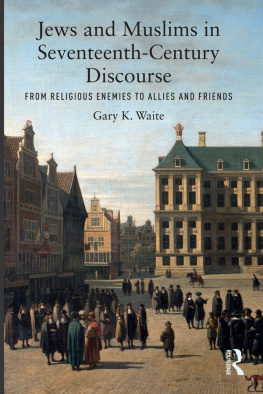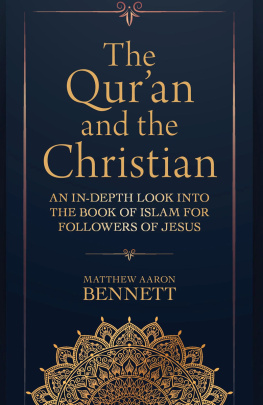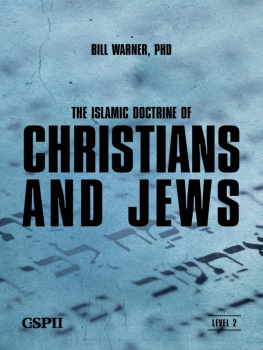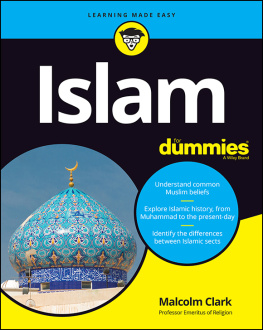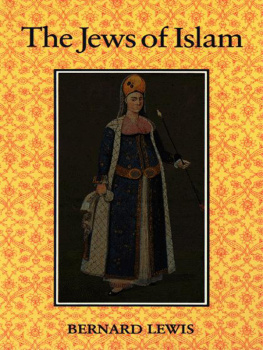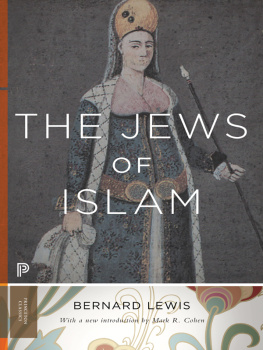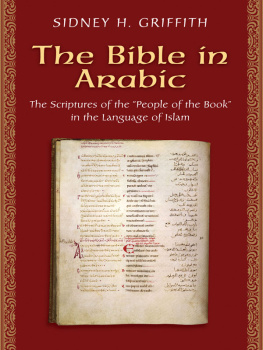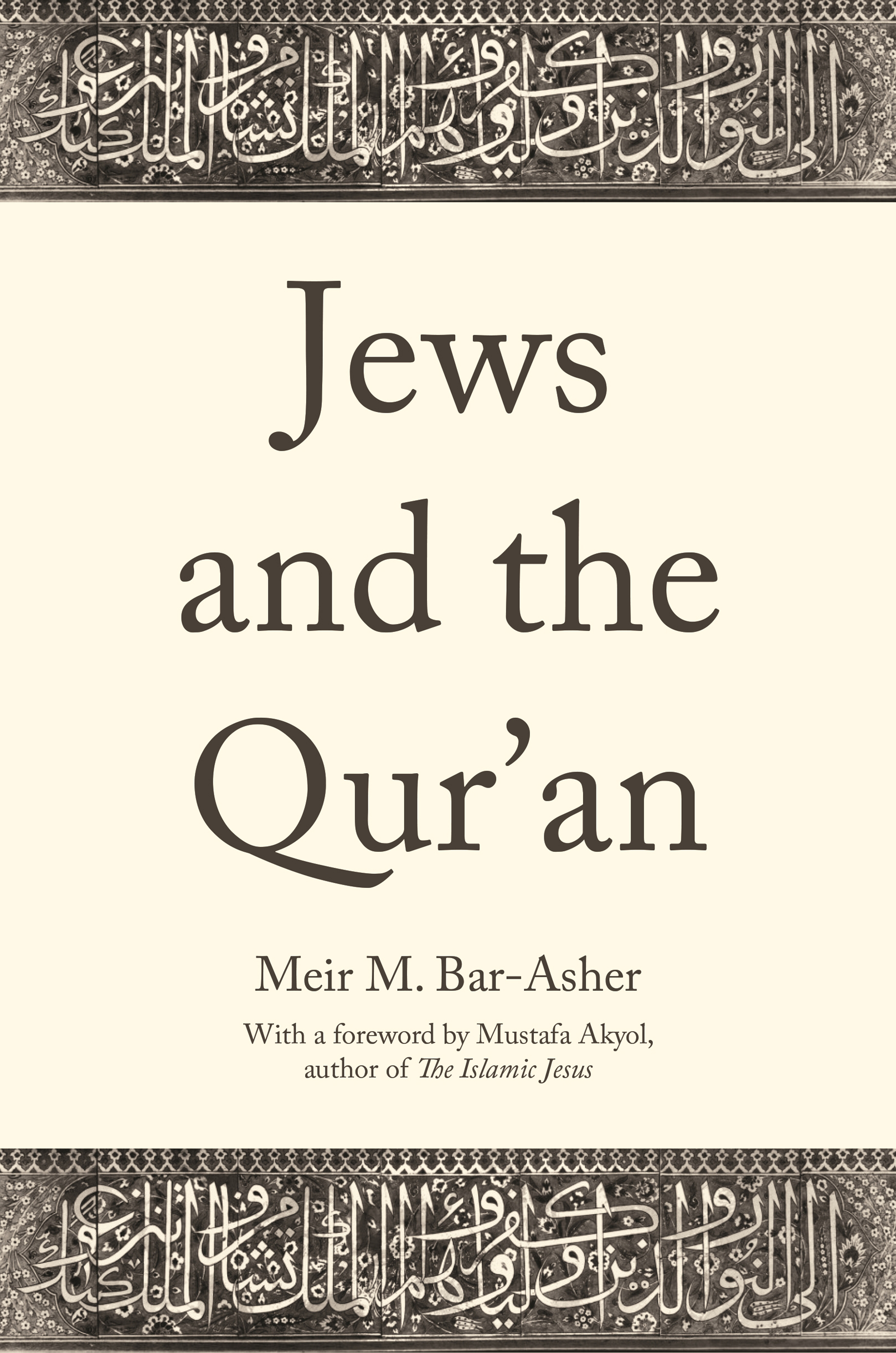JEWS AND THE QURAN
Jews and the Quran
MEIR M. BAR-ASHER
TRANSLATED BY ETHAN RUNDELL
WITH A FOREWORD BY MUSTAFA AKYOL, AUTHOR OF THE ISLAMIC JESUS
PREFACE BY MOHAMMAD ALI AMIR-MOEZZI
PRINCETON UNIVERSITY PRESS
PRINCETON & OXFORD
English translation copyright 2021 by Princeton University Press
Princeton University Press is committed to the protection of copyright and the intellectual property our authors entrust to us. Copyright promotes the progress and integrity of knowledge. Thank you for supporting free speech and the global exchange of ideas by purchasing an authorized edition of this book. If you wish to reproduce or distribute any part of it in any form, please obtain permission.
Requests for permission to reproduce material from this work should be sent to
Published by Princeton University Press
41 William Street, Princeton, New Jersey 08540
6 Oxford Street, Woodstock, Oxfordshire OX20 1TR
press.princeton.edu
All Rights Reserved
Originally published as Les Juifs dans le Coran
Editions Albin MichelParis 2019
ISBN 978-0-691-21135-0
ISBN (e-book) 978-0-691-23258-4
Version 1.0
Library of Congress Control Number: 2021945070
British Library Cataloging-in-Publication Data is available
Editorial: Fred Appel and James Collier
Production Editorial: Karen Carter
Jacket/Cover Design: Layla Mac Rory
Production: Erin Suydam
Publicity: Kate Hensley and Kathryn Stevens
Jacket/Cover Credit: Tile panel with verses from the Quran. Once a decorative part of an architectural monument in Iznik, Turkey. 16th century / The Walters Art Museum, Baltimore, MD
In memory of my dear sisters, Hadassa and Sima.
CONTENTS
- xi
- xv
- xix
- al-baqara )
- israiliyyat
- qibla
- ahl al-kitab
FOREWORD
Mustafa Akyol
IN THE SECOND HALF of the twentieth century, it became fashionable in the West to speak of the Judeo-Christian tradition. The term referred to a fact that most Christians had not acknowledged for almost two millennia: that Christianity was born out of Judaismby inheriting it, universalizing it, but also struggling with it, at times through hostility and oppression.
There is a similarly valid Judeo-Islamic tradition which has not yet received the attention it deserves. For, Islam, too, claims the heritage of the Jewish patriarchs and prophetsAbraham and his sons, as well as Joseph or Mosesand even adds a self-acclaimed mission to universalize their faith to all humanity. Moreover, Islam proves even closer to Judaism than to Christianity in its theology and practice. Its theology is a strict monotheism that has no place for a divine messiah, graven images, or being saved by graceunlike Christianity, but just like Judaism. And its practice is defined by Islams legal tradition, Sharia, which is unmistakably modeled on the Jewish legal tradition, Halakha.
In addition, until the modern era the fate of Jews in the lands of Islam was often more tolerable than that of Christians. This explains why some Jews in territories with a Christian majority, such as Catholic Spain, fled to majority-Muslim lands, such as the Ottoman Empire. The latters capital, Istanbul, my hometown, was for centuries unquestionably the best place in the world for Jews to live, as historian Alan Mikhail puts it.
Yet one also can see in the birth pangs of the new religion of Islam a tension between it and Judaism. For it is the inevitable calling of every new religion to explain what went wrong before it appeared; namely, the errors it has come to correct. And while early Islams main nemesis was polytheism, it had to mark its divergences from Christianity and Judaism as well, although in different and interesting ways.
In this meticulously written and highly readable book, Meir M. Bar-Asher masterfully portrays this complex relation between Judaism and Islam, by focusing on how the latterat its core, the Quransees the former. (Judaisms view of Islam would also be an interesting story, but that would be another book.) He is right to argue, I believe, that this is a relation full of ambiguity. On the one hand, there are the positive declarations in the Quran about Israelites as Gods chosen people who upheld his earlier revelation, the Torah, to which Quran shows utmost respect. On the other hand, the same Israelitesand their Jewish descendantsare depicted as a people that broke their Covenant with God, corrupted the Torah (or at least its interpretations), and also acted treacherously toward the early Muslim community.
As Bar-Asher shows, the same ambiguity characterizes the Quranic attitude toward Jewish religious practices. On the one hand, Islam adopts various aspects of the Jewish Law, such as the prohibition of pork, blood, and carrion. On the other hand, it shows a deliberate desire to draw away from Judaism, evidenced in its rejection of the more complicated details of Jewish dietary laws, and in its fateful change of the direction of Islamic prayer from Jerusalem to Mecca.
I believe that this objective assessment of Jews in the Quran will be a contribution not only to scholarship on Jewish-Muslim relations, but also to a broader understanding of that relationship. In recent times, popular books published in Western countries have been saturated with efforts to depict Islamunfairly and inaccuratelyas either a hopelessly anti-Semitic creed, or as a utopia of interfaith co-existence. The truth is certainly more complex, as Bar-Asher shows in his analysis.
To me, and to other Muslims who believe there should be no enmity toward anyone without a good reason, a nuanced approach of this kind is helpful in reconciling seemingly antagonistic Quranic verses concerning relations between Muslims and other peoples. One of them, verse 5:51, discussed more than once in Bar-Ashers book, reads as follows: O you who believe, do not take the Jews and the Christians as friends. They are friends of each other. But this forbidding advice is balanced by verse 60:8: [God] does not forbid you to deal kindly and justly with anyone who has not fought you for your faith or driven you out of your homes. Cases such as these, in which the Quran appears to be interpreting itself, helps us put seemingly intolerant commandments into a broader framework of fairnessunless the magnanimous verses are considered to be abrogated by the antagonistic ones, as quite a few traditional exegetes have unfortunately suggested.
I would also underline another important point captured in this book: the ambiguity of the Quran concerning Jews and Judaism has made it easy for Muslims to be selective in their approach to the issueand throughout Islamic history political context has played a decisive role in their choices. In the modern era, the toxic politics surrounding the Arab-Israeli conflict led to a re-reading of the Quran, and the life of the Prophet, that generated a decidedly dark portrait of Jews. That is why, as Bar-Asher puts it, traditional [Islamic] exegesis tended to focus more on specifying the circumstances in which a given verse applied whereas the modern tendency is to absolutize its meaning and transform it into an ideological weapon. He also shows how this ideological weapon works in the narratives of militant groups such as Hamas.
Yet, I am happy to add, a different trend is gaining momentum among Muslim minority communities in Western countries, in which Jews are seen not as rebellious dhimmis or perfidious conspirators but instead as a fellow minority facing similar challenges. I am thinking in particular of white supremacists in the United States, whose venom threatens both synagogues and mosques, and of intrusive laws in Europe that encroach on such religious practices of both Jews and Muslims as circumcision, or the kosher and halal slaughter of animals. Consequently, perhaps for the first time in their history, Jews and Muslims are seeking religious tolerance and freedom together, and beginning to discover their commonalities as fellow Semites in a gentile world.


